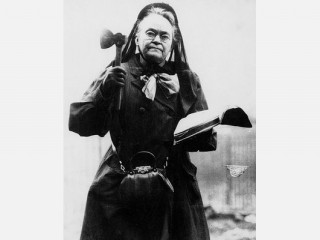
Carry Nation biography
Date of birth : 1846-11-25
Date of death : 1911-06-02
Birthplace : Garrard County, Kentucky
Nationality : American
Category : Historian personalities
Last modified : 2022-03-16
Credited as : Reformer, member of the temperance movement,
The actions of Carry Amelia Moore Nation, American temperance reformer and moral agitator, helped bring on the prohibition era.
Carry Amelia Moore was born in Garrard County, Ky., on Nov. 25, 1846, into a well-to-do slave-holding household. She was raised in an intensely religious atmosphere. On her mother's side there was evidence of eccentricity and insanity, and Carry's youth mixed emotionalism with stern suppression. The Moores moved a number of times, and during the Civil War her father lost his fortune. In 1865 the family settled in Belton, Mo. Carry earned a teaching certificate at the state normal school.
In 1867 Carry married Dr. Charles Gloyd. He soon proved an irresponsible alcoholic, and though she loved him and was pregnant, she returned home. He died shortly after. Her child, born weak of mind, was an expense and trouble for years. After teaching school for a few years, Carry married David Nation, a lawyer, minister, and journalist, in 1877.
The Nations moved to Medicine Lodge, Kans. In 1889 a great fire stopped short of Nation's hotel, convincing her that she was divinely shielded. Her religious fervor increasingly took the form of hallucinations and public displays. She found an outlet in the work of the Women's Christian Temperance Union (WCTU) throughout the 1890s. This group became very active because the Kansas law prohibiting the sale of liquor was not being enforced.
In 1899 and into 1900 Nation and other WCTU women developed a campaign of prayer and religious song outside local saloons. A tall, powerful, determined woman, Nation was first treated roughly and with contempt. She then began an offensive which made her internationally famous. She and her friends returned to the "joints" and in violent confrontations and challenges to the law, which she held remiss for not enforcing prohibition, they succeeded in closing the saloons.
The tumult Nation had stirred up inspired her to broaden her campaign. In Wichita and Topeka, Kans., and other cities, wearing her famous black dress and bonnet and carrying a Bible and an iron rod, she roused citizens and officials. On Jan. 21, 1901, at Wichita, she first used the hatchet that became her trademark.
Strongly convinced of divine guidance—she thought her name (Carry A. Nation) had been predestined—Nation extended her activities, though on occasion she stood trial and served time in jail. The WCTU was not in wholehearted support of her. Her husband divorced her on grounds of desertion. Her lectures and publications (The Smasher's Mail, The Hatchet) earned money that she spent freely on such reforms as a home for wives of alcoholics in Kansas City, Kans.
A trip to New York City was picturesque but ineffective, and increasingly, during raids in major cities from San Francisco, Calif., to Washington, D.C., Nation became a symbol of aggression rather than of temperance reform. Her distaste for tobacco and contemporary women's clothes accentuated her conservative character. By the time of her death in Leavenworth, Kans., on June 2, 1911, it was clear that she had outlived her time.
Carry Nation's autobiography, The Use and Need of the Life of Carry A. Nation (1904), is vivid and informative. Her major biographers have been remarkably judicious and understanding, though philosophically opposed to her on most counts. See Herbert Asbury, Carry Nation (1929); Carleton Beals, Cyclone Carry: The Story of Carry Nation (1962); and Robert Lewis Taylor, Vessel of Wrath: The Life and Times of Carry Nation (1966).
















